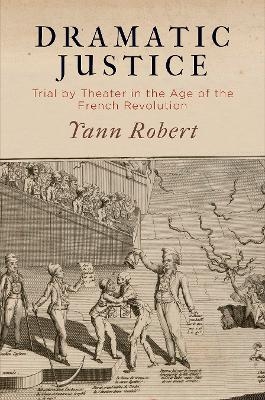
Dramatic Justice
Trial by Theater in the Age of the French Revolution
Seiten
2018
University of Pennsylvania Press (Verlag)
978-0-8122-5075-6 (ISBN)
University of Pennsylvania Press (Verlag)
978-0-8122-5075-6 (ISBN)
For most of the seventeenth and eighteenth centuries, classical dogma and royal censorship worked together to prevent French plays from commenting on, or even worse, reenacting current political and judicial affairs. Criminal trials, meanwhile, were designed to be as untheatrical as possible, excluding from the courtroom live debates, trained orators, and spectators. According to Yann Robert, circumstances changed between 1750 and 1800 as parallel evolutions in theater and justice brought them closer together, causing lasting transformations in both.
Robert contends that the gradual merging of theatrical and legal modes in eighteenth-century France has been largely overlooked because it challenges two widely accepted narratives: first, that French theater drifted toward entertainment and illusionism during this period and, second, that the French justice system abandoned any performative foundation it previously had in favor of a textual one. In Dramatic Justice, he demonstrates that the inverse of each was true. Robert traces the rise of a "judicial theater" in which plays denounced criminals by name, even forcing them, in some cases, to perform their transgressions anew before a jeering public. Likewise, he shows how legal reformers intentionally modeled trial proceedings on dramatic representations and went so far as to recommend that judges mimic the sentimental judgment of spectators and that lawyers seek private lessons from actors. This conflation of theatrical and legal performances provoked debates and anxieties in the eighteenth century that, according to Robert, continue to resonate with present concerns over lawsuit culture and judicial entertainment.
Dramatic Justice offers an alternate history of French theater and judicial practice, one that advances new explanations for several pivotal moments in the French Revolution, including the trial of Louis XVI and the Terror, by showing the extent to which they were shaped by the period's conflicted relationship to theatrical justice.
Robert contends that the gradual merging of theatrical and legal modes in eighteenth-century France has been largely overlooked because it challenges two widely accepted narratives: first, that French theater drifted toward entertainment and illusionism during this period and, second, that the French justice system abandoned any performative foundation it previously had in favor of a textual one. In Dramatic Justice, he demonstrates that the inverse of each was true. Robert traces the rise of a "judicial theater" in which plays denounced criminals by name, even forcing them, in some cases, to perform their transgressions anew before a jeering public. Likewise, he shows how legal reformers intentionally modeled trial proceedings on dramatic representations and went so far as to recommend that judges mimic the sentimental judgment of spectators and that lawyers seek private lessons from actors. This conflation of theatrical and legal performances provoked debates and anxieties in the eighteenth century that, according to Robert, continue to resonate with present concerns over lawsuit culture and judicial entertainment.
Dramatic Justice offers an alternate history of French theater and judicial practice, one that advances new explanations for several pivotal moments in the French Revolution, including the trial of Louis XVI and the Terror, by showing the extent to which they were shaped by the period's conflicted relationship to theatrical justice.
Yann Robert teaches French and Francophone studies at the University of Illinois at Chicago.
Introduction
PART I. THEATER AS JUSTICE
Chapter 1. Fixing the Law: Reenactment in Diderot's Fils naturel
Chapter 2. The Many Faces of Aristophanes: The Rise of a Judicial Theater
PART II. JUSTICE AS THEATER
Chapter 3. Players at the Bar: The Birth of the Modern Lawyer
Chapter 4. Judges, Spectators, and Theatrocracy
Chapter 5. From Parterre to Pater: Dreaming of Domestic Tribunals
PART III. THE REVOLUTION'S PERFORMANCE OF JUSTICE
Chapter 6. Performing Justice in the Early Years of the Revolution
Chapter 7. The Curtain Falls on Judicial Theater and Theatrical Justice
Notes
Bibliography
Index
Acknowledgments
| Erscheinungsdatum | 17.10.2018 |
|---|---|
| Zusatzinfo | 1 illus. |
| Verlagsort | Pennsylvania |
| Sprache | englisch |
| Maße | 152 x 229 mm |
| Themenwelt | Kunst / Musik / Theater ► Theater / Ballett |
| Geisteswissenschaften ► Sprach- / Literaturwissenschaft ► Anglistik / Amerikanistik | |
| Geisteswissenschaften ► Sprach- / Literaturwissenschaft ► Literaturgeschichte | |
| Geisteswissenschaften ► Sprach- / Literaturwissenschaft ► Literaturwissenschaft | |
| Geisteswissenschaften ► Sprach- / Literaturwissenschaft ► Romanistik | |
| ISBN-10 | 0-8122-5075-3 / 0812250753 |
| ISBN-13 | 978-0-8122-5075-6 / 9780812250756 |
| Zustand | Neuware |
| Haben Sie eine Frage zum Produkt? |
Mehr entdecken
aus dem Bereich
aus dem Bereich
Poetik eines sozialen Urteils
Buch | Hardcover (2023)
De Gruyter (Verlag)
59,95 €
Buch | Softcover (2024)
belleville (Verlag)
20,00 €


